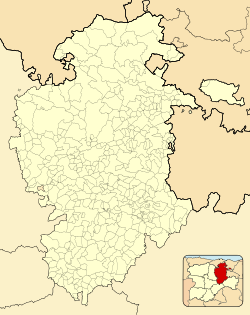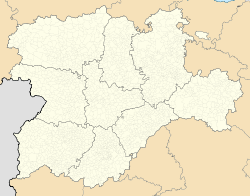This article needs additional citations for verification. (January 2018) |
Briviesca | |
|---|---|
Municipality and town | |
 Santa María church (15th-18th century) | |
| Motto: Capital de La Bureba ("La Bureba's capital") | |
| Coordinates: 42°33′00″N 3°19′00″W / 42.55000°N 3.31667°W | |
| Country | |
| Autonomous community | |
| Province | Burgos |
| Comarca | La Bureba |
| Area | |
| • Total | 81 km2 (31 sq mi) |
| Elevation | 726 m (2,382 ft) |
| Population (2018)[1] | |
| • Total | 6,675 |
| • Density | 82/km2 (210/sq mi) |
| Time zone | UTC+1 (CET) |
| • Summer (DST) | UTC+2 (CEST) |
| Postal code | 09240 |
| Website | http://ayto.briviesca.es/ |
Briviesca is a municipality and a Spanish city located in the north of the Iberian Peninsula, head of the judicial district of Briviesca, capital of the comarca of La Bureba and province of Burgos, autonomous community of Castile and León. According to the demographic data of 2017, the municipality has 6,861 inhabitants, being the 4th most populated in the province. The municipality of Briviesca is made up of five towns: Briviesca (seat or capital), Cameno, Quintanillabón, Revillagodos and Valdazo.
The first settlements date back to the 1st century BC, when the Autrigones, that extended by all the current region of the Bureba and the Upper Ebro valley, established here their capital. Subsequently Briviesca, by then called Virovesca, was already considered an important nucleus of population, where the Romans inhabited in the crossroads of two important Roman roads.
This location, and the boom, in the Middle Ages, of the Camino de Santiago, made Briviesca grow little by little until it reached its maximum splendor in the Renaissance. Nowadays, its location halfway between Miranda de Ebro and Burgos has contributed its industrial and commercial development.
Briviesca has wide green spaces open to fields and mountains, as well as a prominent Monumental Complex with several BICs: the Collegiate Church of Santa María la Mayor; the imposing Monastery of Santa Clara, within there is an important Gothic cloister; the cloister of the "Hospitalillo"; the Plaza Mayor, typical Castilian; its houses and palaces, as well as the Church of San Martín. Close to Briviesca the Santa Casilda's sanctuary is also found.
Briviesca stands out for its large industrial estate "La Vega", in which important industries have been installed since the 70s, although today it is mainly made up of small industries and storage warehouses, especially farm implements, which is the main economic activity, not only of the city, but of the entire region. In the last decades, this has led to Briviesca increasing considerably of population. Nevertheless, due to the economic crisis that started in 2008, this luck was interrupted by losing an average of almost 100 inhabitants per year.
- ^ Municipal Register of Spain 2018. National Statistics Institute.




